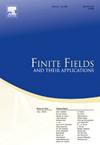偶特征有限域上形式为x+γTrqq3(h(x))的置换多项式的新构造
IF 1.2
3区 数学
Q1 MATHEMATICS
引用次数: 0
摘要
有限域上的置换多项式在数学和工程的许多领域都有应用。特别是形式为x+γTrqqn(h(x))的置换多项式已经被研究了很长时间。本文进一步研究了具有偶特征的有限域上形式为x+γTrqq3(h(x))的置换多项式。一方面,通过选择低q度的函数h(x),我们提出了四类形式为x+γTrqq3(h(x)) / Fq3的置换多项式。另一方面,我们给出了7种形式为x+Trqq3(h(x))的二项式h(x) / Fq3的排列。最后,我们还证明了本文构造的置换多项式与已知的置换多项式不是拟乘法等价的。本文章由计算机程序翻译,如有差异,请以英文原文为准。
New constructions of permutation polynomials of the form x+γTrqq3(h(x)) over finite fields with even characteristic
Permutation polynomials over finite fields have applications in many areas of mathematics and engineering. Particularly, permutation polynomials of the form have been studied for a long time. In this paper, we further investigate permutation polynomials of the form over finite fields with even characteristic. For one thing, by choosing functions with a low q-degree, we propose four classes of permutation polynomials of the form over . For the other thing, we give seven classes of permutations of the form with binomials over . Finally, we also show that the permutation polynomials constructed in this paper are not quasi-multiplicative equivalent to the known permutation polynomials.
求助全文
通过发布文献求助,成功后即可免费获取论文全文。
去求助
来源期刊
CiteScore
2.00
自引率
20.00%
发文量
133
审稿时长
6-12 weeks
期刊介绍:
Finite Fields and Their Applications is a peer-reviewed technical journal publishing papers in finite field theory as well as in applications of finite fields. As a result of applications in a wide variety of areas, finite fields are increasingly important in several areas of mathematics, including linear and abstract algebra, number theory and algebraic geometry, as well as in computer science, statistics, information theory, and engineering.
For cohesion, and because so many applications rely on various theoretical properties of finite fields, it is essential that there be a core of high-quality papers on theoretical aspects. In addition, since much of the vitality of the area comes from computational problems, the journal publishes papers on computational aspects of finite fields as well as on algorithms and complexity of finite field-related methods.
The journal also publishes papers in various applications including, but not limited to, algebraic coding theory, cryptology, combinatorial design theory, pseudorandom number generation, and linear recurring sequences. There are other areas of application to be included, but the important point is that finite fields play a nontrivial role in the theory, application, or algorithm.

 求助内容:
求助内容: 应助结果提醒方式:
应助结果提醒方式:


